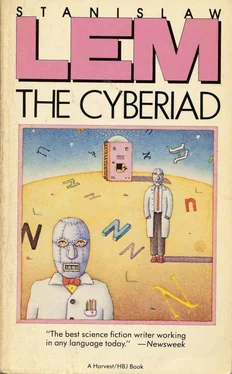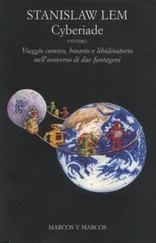“Well, that’s an improvement!” shouted Trurl, not entirely convinced. “The last line particularly, did you notice?”
“If this is all you have to show me…” said Klapaucius, the very soul of politeness.
“Damn!” said Trurl and again disappeared inside the machine. There was a fierce banging and clanging, the sputtering of shorted wires and the muttering of an even shorter temper, then Trurl stuck his head out of a trapdoor on the third story and yelled, “ Now try it!”
Klaupaucius complied. The electronic bard shuddered from stem to stern and began:
Oft, in that wickless chalet all begorn,
Where whilom soughed the mossy sappertort
And you were wont to bong—
Trurl yanked out a few cables in a fury, something rattled and wheezed, the machine fell silent. Klapaucius laughed so hard he had to sit on the floor. Then suddenly, as Trurl was rushing back and forth, there was a crackle, a clack, andthe machine with perfect poise said:
The Petty and the Small;
Are overcome with gall;
When Genius, having faltered, fails to fall.
Klapaucius too, I ween,
Will turn the deepest green
To hear such flawless verse from Trurl’s machine.
“There you are, an epigram! And wonderfully apropos!” laughed Trurl, racing down the metal stairs and flinging himself delightedly into his colleague’s arms. Klapaucius, quite taken aback, was no longer laughing.
“What, that ?” he said. “That’s nothing. Besides, you had it all set up beforehand.”
“Setup?!”
“Oh, it’s quite obvious… the ill-disguised hostility, the poverty of thought, the crudeness of execution.”
“All right, then ask it something else! Whatever you like! Go on! What are you waiting for? Afraid?!”
“Just a minute,” said Klapaucius, annoyed. He was trying to think of a request as difficult as possible, aware that any argument on the quality of the verse the machine might be able to produce would be hard if not impossible to settle either way. Suddenly he brightened and said:
“Have it compose a poem—a poem about a haircut! But lofty, noble, tragic, timeless, full of love, treachery, retribution, quiet heroism in the face of certain doom! Six lines, cleverly rhymed, and every word beginning with the letter s !!”
“And why not throw in a full exposition of the general theory of nonlinear automata while you’re at it?” growled Trurl. “You can’t give it such idiotic—”
But he didn’t finish. Amelodious voice filled the hall with the following:
Seduced, shaggy Samson snored.
She scissored short. Sorely shorn,
Soon shackled slave, Samson sighed,
Silently scheming,
Sightlessly seeking
Some savage, spectacular suicide.
“Well, what do you say to that?” asked Trurl, his arms folded proudly. But Klapaucius was already shouting:
“Now all in g ! A sonnet, trochaic hexameter, about an old cyclotron who kept sixteen artificial mistresses, blue and radioactive, had four wings, three purple pavilions, two lacquered chests, each containing exactly one thousand medallions bearing the likeness of Czar Murdicog the Headless…”
“Grinding gleeful gears, Gerontogyron grabbed / Giggling gynecobalt-6o golems,” began the machine, but Trurl leaped to the console, shut off the power and turned, defending the machine with his body.
“Enough!” he said, hoarse with indignation. “How dare you waste a great talent on such drivel? Either give it decent poems to write or I call the whole thing off!”
“What, those aren’t decent poems?” protested Klapaucius.
“Certainly not! I didn’t build a machine to solve ridiculous crossword puzzles! That’s hack work, not Great Art! Just give it a topic, any topic, as difficult as you like…”
Klapaucius thought, and thought some more. Finally he nodded and said:
“Very well. Let’s have a love poem, lyrical, pastoral, and expressed in the language of pure mathematics. Tensor algebra mainly, with a little topology and higher calculus, if need be. But with feeling, you understand, and in the cybernetic spirit.”
“Love and tensor algebra? Have you taken leave of your senses?” Trurl began, but stopped, for his electronic bard was already declaiming:
Come, let us hasten to a higher plane,
Where dyads tread the fairy fields of Venn,
Their indices bedecked from one to n ,
Commingled in an endless Markov chain!
Come, every frustum longs to be a cone,
And every vector dreams of matrices.
Hark to the gentle gradient of the breeze:
It whispers of a more ergodic zone.
In Riemann, Hilbert or in Banach space
Let superscripts and subscripts go their ways
Our asymptotes no longer out of phase,
We shall encounter, counting, face to face.
I’ll grant thee random access to my heart,
Thou’ll tell me all the constants of thy love;
And so we two shall all love’s lemmas prove,
And in our bound partition never part.
For what did Cauchy know, or Christoffel,
Or Fourier, or any Boole or Euler,
Wielding their compasses, their pens and rulers,
Of thy supernal sinusoidal spell?
Cancel me not—for what then shall remain?
Abscissas, some mantissas, modules, modes,
A root or two, a torus and a node:
The inverse of my verse, a null domain.
Ellipse of bliss, converge, O lips divine!
The product of our scalars is defined!
Cyberiad draws nigh, and the skew mind
Cuts capers like a happy haversine.
I see the eigenvalue in thine eye,
I hear the tender tensor in thy sigh.
Bernoulli would have been content to die,
Had he but known such a 2cos 2 Ø !
This concluded the poetic competition, since Klapaucius suddenly had to leave, saying he would return shortly with more topics for the machine; but he never did, afraid that in so doing, he might give Trurl more cause to boast. Trurl of course let it be known that Klapaucius had fled in order to hide his envy and chagrin. Klapaucius meanwhile spread the word that Trurl had more than one screw loose on the subject of that so-called mechanical versifier.
Not much time went by before news of Trurl’s computer laureate reached the genuine—-that is, the ordinary—poets. Deeply offended, they resolved to ignore the machine’s existence. A few, however, were curious enough to visit Trurl’s electronic bard in secret. It received them courteously, in a hall piled high with closely written paper (for it worked day and night without pause). Now these poets were all avant-garde, and Trurl’s machine wrote only in the traditional manner; Trurl, no connoisseur of poetry, had relied heavily on the classics in setting up its program. The machine’s guests jeered and left in triumph. The machine was self-programming, however, and in addition had a special ambition-amplifying mechanism with glory-seeking circuits, and very soon a great change took place. Its poems became difficult, ambiguous, so intricate and charged with meaning that they were totally incomprehensible. When the next group of poets came to mock and laugh, the machine replied with an improvisation that was so modern, it took their breath away, and the second poem seriously weakened a certain sonneteer who had two State awards to his name, not to mention a statue in the city park. After that, no poet could resist the fatal urge to cross lyrical swords with Trurl’s electronic bard. They came from far and wide, carrying trunks and suitcases full of manuscripts. The machine would let each challenger recite, instantly grasp the algorithm of his verse, and use it to compose an answer in exactly the same style, only two hundred and twenty to three hundred and forty-seven times better.
Читать дальше












